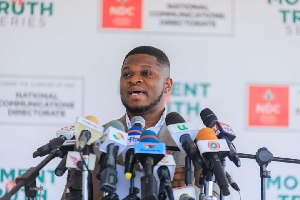- Home - News
- TWI News | TV
- Polls
- Year In Review
- News Archive
- Crime & Punishment
- Politics
- Regional
- Editorial
- Health
- Ghanaians Abroad
- Tabloid
- Africa
- Religion
- Election 2020
- Coronavirus
- News Videos | TV
- Photo Archives
- News Headlines
- Press Release
Business News of Thursday, 18 September 2014
Source: B&FT
Gov’t, IMF bailout negotiation ends next week
The International Monetary Fund (IMF) has said that its negotiations on a possible programme with government on how the Fund can help the country’s economic problems and accelerate Ghana’s journey to restored economic stability will come to a close next week Thursday.
The IMF team, which began the bailout discussions with government yesterday, is being led by Joel Toujas-Bernate while Professor Kwesi Botchway, Chairman of the National Development Planning Commission, is leading the government’s team. Aside from meeting the government team, the IMF team is expected to hold talks with the private sector and the donor community.
According to the IMF, when its mission to Ghana closes discussions with government next week, there will be further talks between the two parties -- including at the annual general meetings of the World Bank and IMF in Washington DC in October.
Already, some stakeholders in the financial services industry are confident that the imminent intervention by the IMF in government’s fiscal policy space will help to restore stability and confidence in the economy.
The Bretton-Woods institution has previously expressed its willingness to help Ghana to get out of its current economic quagmire, following a formal request sent to the IMF by government in August.
According to Mr. Tekper, government opted to seek IMF’s assistance in a bid to stem the slide of the cedi, dampening hopes in the government’s own “home-grown” solutions.
For the first eight months of year, the cedi depreciated against the US dollar by about 30 percent as per Bank of Ghana data, while other economists have pegged the rate of depreciation at 40%, pushing the country to a point where it needed the IMF’s help to stabilise the currency, boost confidence in government’s policies and accelerate the journey to restored economic stability.
The IMF has a history of delivering such benefits -- but always at very great cost. It is this cost that must now be negotiated following the President’s directive to his advisors “to open discussions with the IMF and other development partners in support of our programme for stabilisation and growth”.
The IMF has already given an inkling of what it would do to heal the economy if it were making the decisions. In its May country report, it proposed a “menu of additional short-term adjustment measures” after saying that “in light of Ghana’s significant fiscal and external balances, government [should] target a larger and more frontloaded fiscal consolidation”.










